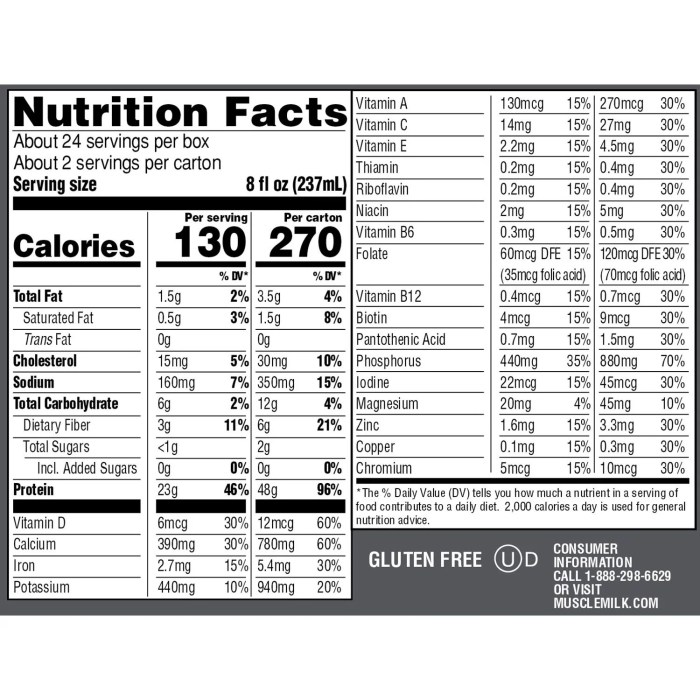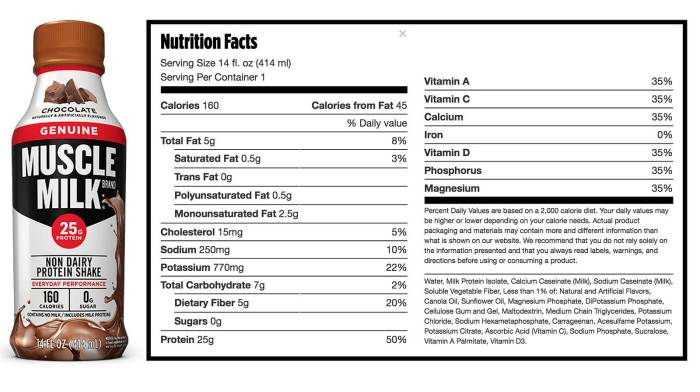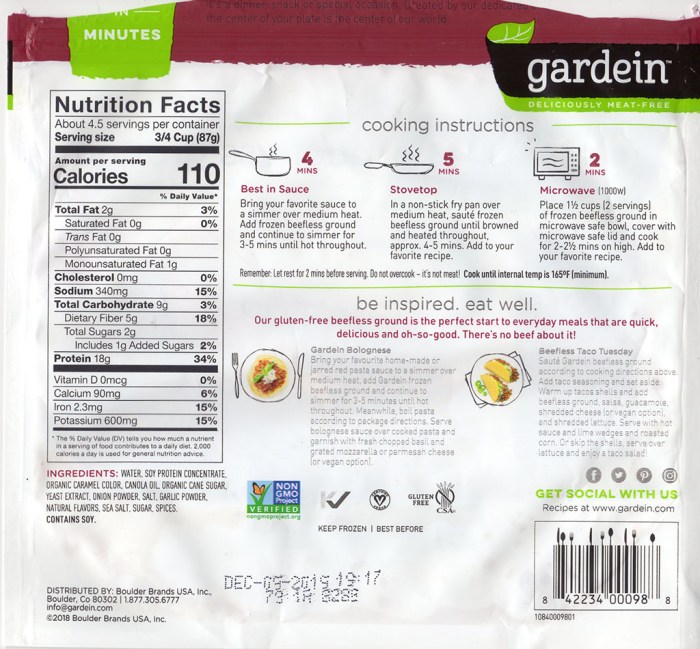Macro Nutrient Profile of Muscle Milk
Muscle milk nutrition facts – Muscle Milk, a popular protein shake, boasts a specific macronutrient profile designed to support muscle growth and recovery. Understanding this profile is crucial for athletes and fitness enthusiasts aiming to optimize their nutritional intake. Let’s delve into the specifics of Muscle Milk’s composition and compare it to other popular options on the market.
Muscle Milk Macronutrient Breakdown
The macronutrient content of Muscle Milk can vary slightly depending on the flavor and specific product. However, a typical serving (one 32-ounce bottle) generally provides the following:
| Nutrient | Grams per Serving | Percentage of Daily Value (Approximate) | Source |
|---|---|---|---|
| Protein | 50-60g | 100-120% | Whey protein concentrate, casein protein |
| Carbohydrates | 30-40g | 10-20% | Maltodextrin, other carbohydrates |
| Fat | 5-10g | 5-10% | Soybean oil, other fats |
Note: Daily Value percentages are estimates and can vary based on individual dietary needs and calorie requirements. Always check the nutrition label on the specific product you are consuming for the most accurate information.
Comparison with Other Protein Shakes
To better understand Muscle Milk’s place in the protein shake market, let’s compare its macronutrient profile to some competitors. The following table provides a general comparison; specific values may vary based on flavor and serving size.
| Protein Shake | Protein (g) | Carbohydrates (g) | Fat (g) |
|---|---|---|---|
| Muscle Milk | 50-60 | 30-40 | 5-10 |
| Optimum Nutrition Gold Standard Whey | 24-30 | 1-5 | 1-5 |
| Premier Protein Shake | 30 | 10 | 3 |
| Vega Sport Protein | 30 | 20 | 5 |
This comparison highlights that Muscle Milk generally contains a higher amount of carbohydrates compared to other shakes. This is a key differentiator and should be considered when choosing a protein shake that aligns with your dietary goals.
Glycemic Index and Blood Sugar Impact
The carbohydrates in Muscle Milk primarily consist of maltodextrin, a rapidly digestible carbohydrate with a high glycemic index (GI). This means that consuming Muscle Milk can lead to a relatively quick spike in blood sugar levels. For individuals with diabetes or those sensitive to blood sugar fluctuations, this might be a factor to consider. However, the protein and fat content in Muscle Milk can help moderate the rate of glucose absorption, lessening the impact compared to consuming pure maltodextrin.
The overall effect on blood sugar will depend on individual factors like insulin sensitivity and overall diet. For instance, consuming Muscle Milk after intense physical activity when glycogen stores are depleted will likely have a different effect than consuming it before bed.
Micronutrient Content in Muscle Milk

Muscle Milk, while primarily known for its macro-nutrient profile, also offers a blend of essential vitamins and minerals crucial for overall health and well-being. Understanding the micronutrient content allows for a more comprehensive assessment of its nutritional value and its potential contribution to a balanced diet. This section delves into the specific vitamins and minerals present, their roles in the body, and how their quantities compare to recommended daily intakes.
Let’s examine the micronutrient composition of a typical serving of Muscle Milk. Keep in mind that the exact amounts can vary slightly depending on the specific flavor and formulation.
Vitamins and Minerals in Muscle Milk
The following list details the vitamins and minerals typically found in a serving of Muscle Milk. Remember that these values are approximate and may differ based on product variations. Always refer to the nutrition label on your specific Muscle Milk product for the most accurate information.
- Vitamin A: Contributes to vision, immune function, and cell growth.
- Vitamin C: A powerful antioxidant, supporting immune function and collagen synthesis.
- Vitamin D: Essential for calcium absorption, bone health, and immune function.
- Vitamin E: Another crucial antioxidant, protecting cells from damage.
- Vitamin K: Plays a vital role in blood clotting and bone health.
- Vitamin B6 (Pyridoxine): Involved in protein metabolism, red blood cell formation, and brain development.
- Vitamin B12 (Cobalamin): Crucial for nerve function, red blood cell formation, and DNA synthesis.
- Calcium: Essential for strong bones and teeth, muscle function, and nerve transmission.
- Phosphorus: Works with calcium for bone health, also involved in energy production and cell signaling.
- Potassium: Important for fluid balance, muscle contractions, and nerve impulses.
- Magnesium: Plays a role in over 300 biochemical reactions, including muscle and nerve function, blood sugar control, and blood pressure regulation.
- Zinc: Supports immune function, wound healing, and cell growth.
- Iron: Essential for carrying oxygen throughout the body.
Micronutrient Roles and Daily Value Comparison, Muscle milk nutrition facts
The table below provides a comparative analysis of the micronutrients in Muscle Milk against the recommended daily intake (RDI) for adults. It’s important to note that RDIs can vary based on age, sex, and overall health, so this is a general guideline.
| Micronutrient | Amount per Serving (Example Values – Check Product Label) | % Daily Value (Example Values – Check Product Label) | Role in Body |
|---|---|---|---|
| Vitamin A | 100 mcg | 10% | Vision, immune function, cell growth |
| Vitamin C | 10 mg | 11% | Antioxidant, immune function, collagen synthesis |
| Vitamin D | 2 mcg | 20% | Calcium absorption, bone health, immune function |
| Calcium | 300 mg | 30% | Bone health, muscle function, nerve transmission |
| Iron | 2 mg | 10% | Oxygen transport |
Disclaimer: The values presented in the table are illustrative examples only. Always consult the nutrition facts label on your specific Muscle Milk product for accurate information regarding micronutrient content and % Daily Value.
Serving Suggestions and Usage of Muscle Milk
Muscle Milk, with its carefully balanced macronutrient and micronutrient profile, offers significant versatility in dietary integration. Understanding how best to incorporate it into your daily routine is key to maximizing its benefits and achieving your fitness goals. This section will explore practical ways to seamlessly integrate Muscle Milk into a balanced diet and fitness regimen, focusing on optimal timing and sample meal plans.
Optimal Timing for Muscle Milk Consumption
The timing of your Muscle Milk consumption significantly impacts its effectiveness. Consuming it strategically can optimize muscle protein synthesis, recovery, and overall energy levels. Consider these key time points for maximum impact. Pre-workout consumption provides sustained energy, while post-workout intake supports muscle repair and growth. As a meal replacement, it offers a convenient and nutritious option for those short on time or seeking controlled calorie intake.
Creative Serving Suggestions for Muscle Milk
The versatility of Muscle Milk extends beyond simply mixing it with water or milk. Experiment with these creative approaches to enhance flavor and enjoyment while maintaining its nutritional value.
- Smoothie Powerhouse: Blend Muscle Milk with your favorite fruits (berries, bananas), vegetables (spinach, kale), and a liquid base (water, almond milk, coconut water) for a nutrient-packed smoothie. The creamy texture of Muscle Milk complements various ingredients, creating a delicious and filling breakfast or post-workout treat. Imagine a vibrant green smoothie with Muscle Milk, spinach, mango, and a touch of ginger – a refreshing and healthy option.
- Protein-Packed Pancakes or Waffles: Incorporate Muscle Milk into your pancake or waffle batter for an extra protein boost. This simple addition transforms a traditional breakfast into a muscle-building meal. The added protein will increase satiety and support sustained energy levels throughout the morning.
- Baked Goods Enhancement: Use Muscle Milk as a partial replacement for milk or eggs in recipes for muffins, brownies, or cookies. This method subtly adds protein and reduces overall fat content, resulting in healthier baked goods. Imagine moist, protein-rich banana muffins made with Muscle Milk – a guilt-free indulgence.
- Savory Options: While less common, Muscle Milk can be incorporated into savory dishes. Its subtle flavor allows for its inclusion in soups, stews, or even protein-rich sauces without significantly altering the taste profile. Think of a hearty lentil soup enhanced with a scoop of Muscle Milk for added protein and creaminess.
Sample Meal Plan Incorporating Muscle Milk
This sample meal plan demonstrates how Muscle Milk can be integrated into a balanced diet for optimal results. Remember to adjust portion sizes based on your individual caloric needs and fitness goals. This plan focuses on providing sufficient protein for muscle growth and recovery, while also incorporating carbohydrates for energy and healthy fats for overall well-being.
Muscle Milk, a popular protein drink, offers a convenient source of protein and nutrients for those seeking post-workout recovery. However, consideration of other breakfast options is also important; for instance, understanding the nutritional profile of breakfast sausage nutrition facts can help you make informed choices. Comparing this to Muscle Milk’s nutritional content allows for a balanced dietary approach, ensuring you meet your daily needs effectively.
Ultimately, the best choice depends on individual dietary goals and preferences.
| Meal | Description |
|---|---|
| Breakfast | Muscle Milk smoothie with berries, banana, and spinach |
| Lunch | Grilled chicken salad with mixed greens, avocado, and a light vinaigrette |
| Snack | A handful of almonds and a Muscle Milk shake |
| Dinner | Baked salmon with roasted vegetables (broccoli, sweet potatoes) |
| Post-Workout | Muscle Milk shake with water |
Potential Drawbacks and Considerations of Muscle Milk Consumption

Muscle Milk, like any nutritional supplement, offers benefits but also presents potential drawbacks. Understanding these drawbacks and consuming it responsibly is crucial for maximizing its advantages and minimizing any negative effects. While it can be a valuable tool for athletes or individuals seeking to increase their protein intake, relying solely on Muscle Milk or overconsuming it can lead to various health concerns.
A balanced approach, incorporating Muscle Milk strategically within a comprehensive diet, is paramount.While Muscle Milk can be a convenient way to boost protein intake, excessive consumption can lead to several potential issues. Over-reliance on Muscle Milk as a primary source of nutrition can result in nutritional deficiencies, as it may not provide the full range of vitamins, minerals, and fiber found in whole foods.
Furthermore, the high protein content, while beneficial for muscle growth, can strain the kidneys if consumed in excess, particularly for individuals with pre-existing kidney conditions. Digestive discomfort, such as bloating and gas, is another common side effect associated with high protein intake, especially if not properly hydrated.
High Protein Intake Risks and Mitigation
Excessive protein intake can place a significant burden on the kidneys, potentially leading to dehydration and kidney damage. The body processes protein by converting it into urea, a waste product that is filtered and excreted by the kidneys. Consuming excessive amounts of protein forces the kidneys to work harder, potentially leading to long-term health problems. For example, a bodybuilder consuming significantly more protein than recommended without adequate hydration might experience kidney stress, potentially manifesting as fatigue, swelling, and changes in urine output.
To mitigate these risks, it’s crucial to maintain adequate hydration, consume a balanced diet rich in fruits, vegetables, and whole grains, and consult a healthcare professional before drastically increasing your protein intake, especially if you have any pre-existing kidney conditions. Moderation is key; using Muscle Milk as a supplement rather than a meal replacement is a safer and more effective approach.
FAQ Guide: Muscle Milk Nutrition Facts
Is Muscle Milk suitable for weight loss?
Muscle Milk can be part of a weight loss plan, but it’s crucial to manage overall calorie intake. It can help with satiety, but it shouldn’t replace a balanced diet and exercise.
Does Muscle Milk contain artificial sweeteners?
This varies depending on the specific Muscle Milk product. Check the ingredient list on the packaging to confirm the presence or absence of artificial sweeteners.
Can I use Muscle Milk as a meal replacement?
Muscle Milk can be used as a meal replacement occasionally, but it’s not a complete substitute for a balanced meal. It lacks certain essential nutrients found in whole foods.
How should I store Muscle Milk?
Store Muscle Milk according to the instructions on the packaging. Typically, this involves refrigeration after opening to maintain freshness and quality.


